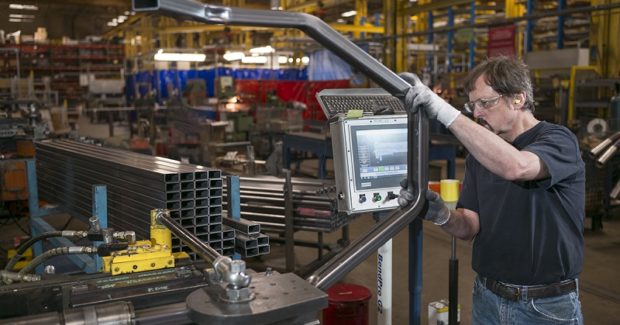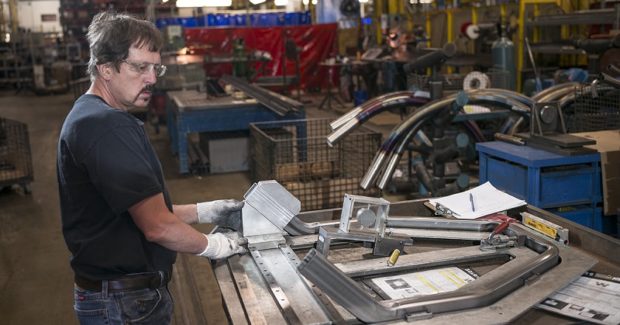Top Considerations for Bending When Working with a Contract Metal Manufacturer
You want and need a versatile, value-focused supplier that functions as a partner and not just a vendor, serves you as an effective extension of your team, and is a critical component to your success. These insights will help you start to safeguard against potential issues that lead to unwanted costs down the road.
Posted: July 17, 2017
In today’s metal fabrication market, many experts are forecasting continued positive growth in the coming years. Demand for bending services has risen dramatically and is near the top of all services for metal fabrication. This points to an increased need for bending service providers to supply reliable, quality precision bends while meeting the challenge of compressed lead times. But not every bending services provider is able or willing to meet that challenge. In recent years, as many manufacturing sectors scrambled to recover from a massive economic downturn, expectations for quick turnaround had become the norm. Now customers seek precision parts at competitive prices, but also expect on-time delivery to match ever tightening lead time demands.
To keep the pace, the industry has focused on addressing many of the issues that have affected setup and change-out. Advancements in process automation have led to significant improvements in bending simulation and automated tool change. Beyond speed, design demands have also risen. Design today leverages three-dimensional software with designers utilizing CAD packages to their fullest, looking for the most economical way to package piping systems or structural members. This often leads to the need for complex three-dimensional bending to allow for maximum performance with minimum material cost. Investments in technology, by way of equipment upgrades and design software, are a necessary part of staying current with market demands.
If you’re one of the many in the market for bending services, here are top considerations to vet your options with and give you the confidence that your bending partner is positioned with the capabilities to meet your needs:
WHAT IS THE BENDING STANDARD BEING OFFERED?
The focus on quality varies from supplier to supplier. One tell-tale sign is the marketplaces being served. For example, when bending to architectural standards, the adherence to higher aesthetic quality standards is always a top requirement. Conversely, you can bend faster with lower quality expectations. The challenge usually run into with a focus centered on speed first, is the potentially unwanted outcome of cutting corners. Running faster but not necessarily with the same concern for quality, will lessen the chances of preserving a high-quality surface finish and decrease the ability to maintain cross sectional shape such as roundness.
https://youtu.be/hI3xLglt7W4
HOW WELL CAN A BENDING SERVICES SUPPLIER ADDRESS CUSTOM ORDERS?
Take a look to see if a full range of bending services are being offered. Those services would include induction, roll and rotary pipe and tube bending for industrial, commercial, recreational and architectural applications. While each situation will vary, below are a few other aspects to consider:
- Can multiple bend configurations be produced to help reduce the amount of welding and polishing steps required?
- Can equipment eliminate special tooling requirements such as costly dies, clamps, wipers and mandrels?
- Are custom templates and configurations available in most pipe and tube sizes, and standard radii?
HOW IS THE BENDER MAXIMIZING BENDING EFFICIENCY?
In an exceedingly competitive market, manufacturers are constantly seeking new ways to shorten lead-times to market a new or improved product. By using reverse engineering, a product or model can be captured in digital form and then used for prototyping. Having a bender that can reverse engineer an application is beneficial because it ultimately provides a solution to compress product development time and maximize bending efficiency.
Poorly applied quality management can affect efficiency when the bending services provider attempts to “inspect in quality” at the end of a production run. This can consume a lot of manpower per part, resulting in higher instances of non-conforming parts, which cause a loss of productivity and increased production costs. Companies that employ state-of-the-art measurement software, like the PC-DMIS system from Hexagon Manufacturing Intelligence (North Kingstown, RI), can integrate design, manufacturing and inspection operations into a single program. PC-DMIS is an interactive graphics measurement software that improves methods for gathering and analyzing dimensional data from all manufacturing operations. Software like PC-DMIS allows benders and their customers to reap the benefits of significant time savings, reduction in scrap and rework costs while enhancing overall productivity.
https://youtu.be/oqCkkKxtRPw
ARE THERE MULTIPLE SERVICES UNDER ONE ROOF?
There is a perpetual unmet need for ways to improve timing and quality while squeezing out costs to remain competitive. The option of having a bending supplier provide an array of complementary services like polishing, welding, tube laser cutting, along with warehousing services is a great way to save on complex supply chain costs, such as varying levels of quality, lead-time creep and shipping.
SEEKING PARTNERS, NOT JUST VENDORS
At the end of the day, when selecting a bending services provider, it’s all about managing the costs of goods sold. To quote Benjamin Franklin, “The bitterness of poor quality remains long after the sweetness of low price is forgotten.” Starting with this list of considerations will help put you in a position to safeguard against potential issues that lead to unwanted costs down the road. A versatile, value-focused supplier that functions as a partner and not just a vendor, serves you as an effective extension of your team and is a critical component to your success.


















